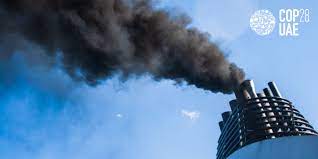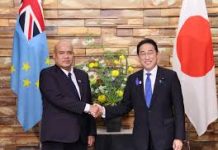By James Bhagwan
For the Pacific Conference of Churches (PCC), the ecumenical alliance for the Pacific region, it was a very difficult decision to go to this year’s COP in Dubai, a conference chaired by the CEO of Dubai’s national oil company who is a significant figure in the global fossil fuel industry, which takes place in one of the major oil producing countries.
PCC’s focus has always been on climate justice, and our colleagues in different collaboration spaces for climate justice spent a lot of time reflecting on whether they will attend COP28. One of our partners has decided to boycott and that got us into a very important discussion about what is our purpose for engaging in the climate change negotiations.
PCC did not attend COP27 last year, after we had participated in a number of COPs, from Copenhagen 2009 (COP 15), up until the 26th in Glasgow in 2021. After comprehensive discussions with our other partners outside of the Pacific, we decided to be in Dubai this year. We have a role to play. There is advocacy work that needs to be done.
Moreover, this year, for the first time, there will be a faith pavilion within the COP Blue Zone where state parties will be gathering. That gives us an opportunity to strengthen our collaboration with other faith communities that are working in this space and really support, pastorally, the work of states’ negotiators, but also activists and others who have a very important role in this place. As part of our advocacy for Pacific States and Civil Society work for common goals for Climate Justice, I have been accredited to COP28 by Fiji and my colleague Ms. Bedi Racule has been accredited by the Republic of the Marshall Islands. That gives us improved access and more opportunities for our prophetic pastoral and practical work.
One focus of PCC at COP28 will be on the urgent need for a rapid phase out of fossil fuels, something the Pacific churches have been constantly calling for. This is a decisive element of climate change mitigation which more recently has been sidelined with a shift of focus to adaptation. Mitigation still needs to be an area that we address; unless we reduce carbon emissions that come with this huge global fossil fuel industry, we won’t maintain our 1.5⁰ target. Then all we are doing is basically responding to the impacts of climate change rather than addressing its causes. The number of new fossil fuel projects that are ready to go worldwide is huge and unconscionable in the context of climate change. The World Council of Churches’ Living Planet document of September 2022 referred to these new projects as ‘carbon bombs’. We are at a breaking point already in terms of current emissions and current fossil fuel plants. And yet, certain countries, while making certain commitments and attending these COP meetings, continue to expand the fossil fuel industry.
The initiative for a Fossil Fuel Non-Proliferation Treaty is a next step to address this challenge. A number of Pacific Island countries (PICs), spearheaded by Vanuatu and Tuvalu, are calling for such a treaty as an approach to rapid emission cuts and a just transition, acknowledging that a just transition is not only about employment and jobs and the fossil fuel industry. We have to note that we are maritime nations, dependent on maritime transport and fossil fuel. Many of us have been advocating for decarbonising the marine or sea transport industry. How can this be done, and how would this affect communities in the PICs that rely so much on fossil fuel for transport between islands? But it is the only way to maintain the 1.5⁰ for which PICSs have fought. In addition to a number of PICs, civil society and academic institutions, churches and other religious groups have come on board to support this treaty, as well as states and cities in developed countries. It will be interesting to see how this treaty campaign can be advanced further at COP28.
The second focus of PCC at this year’s COP will be funding for loss and damage. When it comes to funding for adaptation, currently there is too much focus on bilateral funding. Money is basically used as a development tool in the context of the geopolitical situation, the Pacific Cold War between China on the one hand and the USA and its allies on the other. This money is sold as adaptation money, but actually it is more politically motivated development funding. By contrast, we posit that vulnerable countries need direct access to grant-based funding for loss and damage. Moreover, we have to ensure that funds get to the local communities, rather than being stuck with states. And the funds need to be allocated in terms of severity of need. There is a concern that developed countries will take advantage of the loss and damage framing – instead of giving funds to the most affected communities on small islands, use it in their own countries to deal with the impacts of climate change. Furthermore, the initial capital for a loss and damage fund needs to come from the developed countries. Unfortunately, however, at this stage it is still not clear where the funding will come from.
Another big question is how to deal with the non-economic loss and damage. This is not about the material effects of climate change, such as destruction of infrastructure, industries and agriculture. Rather, it is about the wellbeing of people – the cultural, spiritual, psychosocial trauma that climate change affected communities go through. Dealing with these aspects requires a sustained and contextualized approach. The challenge is how to work with people in communities who experience massive physical loss and damage that leads to deep psychological trauma, and that, for people in the Pacific in particular, is expressed as cultural and spiritual trauma, which cannot be addressed by secular psychosocial trauma counselling.
So, it is about developing culturally appropriate responses, and ensuring that these are ongoing. This cannot be done by just visiting a community for a day or a week, and doing a workshop on counselling. The question is how to help the people in their process of grieving, acknowledging the way that they grieve, not the Western way, not a secular way, but honouring their cultural way of grieving, their spiritual way of grieving, and how to build resilience in that space as well. Developing and designing cultural protocols to deal with these issues, and training pastors, community leaders, traditional leaders in these processes is of utmost importance.
And the question then is who is going to pay for all of this, because you cannot expect the affected communities to pay. We want to bring that dimension into the loss and damage debate. So, when it comes to non-economic loss and damage, it is not so much about compensation because one cannot really compensate for these non-economic losses that have much deeper meaning and perhaps are priceless. Rather the question is how to determine the costs of the processes and the support that are needed to deal with non-economic loss and damage.
Finally, PCC welcomes that ‘peace’ for the first time will be a special issue at COP28. For the Pacific region, this is quite significant. There is an important intersection between climate change and peace. Conflicts can arise from the impacts of climate change. We recognise that intersection. It is important to note that Pacific leaders have continued to say quite strongly that “climate change remains the single greatest threat to the livelihoods, security and wellbeing of the peoples of the Pacific”. In the Pacific, this is not understood in terms of a traditional national or international security perspective, particularly with the context of the geopolitical issues mentioned above. Rather, it is about peace in a much more comprehensive and holistic understanding. We recognise that climate change induced trauma leads to conflict, that climate change induced relocation or displacement leads to conflict, that scarcity of resources also leads to conflict, and that women always are particularly severely affected. We see that conflict resolution and peacebuilding are important aspects to be brought into the climate change discussions. Where that fits in and where that gets support from is going to be very important. So, we’ll be closely monitoring how that will be dealt with at COP28.
All these issues warrant PCC’s participation in COP28.
SOURCE: TODA PEACE INSTITUTE/PACNEWS


















